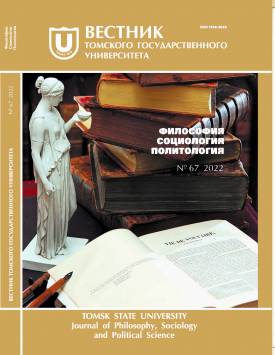Patriotism, civicism in politics and identity of youth
The article includes a theoretical and practical part. In the theoretical part, an attempt is made to determine the role of patriotism and citizenship in the policy of macroidentity, and the related issues are clarified. A review of the main approaches to the definition of patriotism as a political phenomenon, theoretical models and typologies proposed by Western scientists - recognized experts in this field is made. The practical part describes some of the key parameters of the patriotic and civic self-identification of young people, their relationship with critical and active citizenship. The empirical basis of the study is the data of a questionnaire survey (n = 1,364) of Tyumen youth aged 16 to 30, conducted in November - December 2019. The sample is representative in terms of sex and age (error within 5%), formed by a spontaneous selection of respondents. For statistical data processing, the analysis of contingency tables, as well as cluster analysis (k-means method) was used. Three groups of young people were singled out depending on their patriotic selfidentification: identifying themselves as patriots, classifying themselves as patriots only in part, and not considering themselves patriots. The patriotic aspect of self-identification correlates with three groups of citizenship parameters: critical citizenship, responsible citizenship, and active citizenship. Cluster analysis made it possible to classify respondents according to a set of parameters that characterize critical citizenship. Based on this, in groups with different patriotic orientations, two categories of respondents were identified - loyal and critically oriented. The conclusion is made about the intersection of patriotic identity and civic orientations of young people in terms of civic obligations and responsibilities, as well as in relation to formal symbolic behavior demonstrating loyalty to various actors representing the macropolitical community. Attitudes associated with critical citizenship, on the contrary, reduce the degree of young people’s identification as patriots. Respondents who do not consider themselves patriots are characterized by an increased level of criticality -they negatively assess the situation with political rights and freedoms in the country, trust the authorities less, but are more interested in the opportunity to influence and control it. The author declares no conflicts of interests.
Keywords
patriotism,
civicism,
macro-identity politics,
self-identity,
youthAuthors
| Malenkov Vyacheslav V. | Tyumen State University | vvmalenkov@gmail.com |
Всего: 1
References
America's Civic Health Index Report. 2008. URL: https://ncoc.org/research-type/2008-civic-health-index (дата обращения: 10.09.2020).
Социология / Sociology
Малинова О.Ю. Конструирование макрополитической идентичности в постсоветской России: символическая политика в трансформирующейся публичной сфере // ПОЛИТЭКС. 2010. № 1. С. 5-28.
Что значит быть патриотом? // Пресс-выпуск ВЦИОМ № 3685. 09.06.2018. URL: https://wciom.ru/index.php?id=236&uid=9156 (дата обращения: 10.09.2020).
Патриотизм. Сколько в стране патриотов? Должен ли каждый быть патриотом? И каковы критерии патриотизма? // Еженедельный опрос «ФОМнибус» 8-9 июня 2019 г. URL: https://fom.ru/TSennosti/14222 (дата обращения: 10.09.2020).
Критерии патриотизма. Надо ли быть патриотом? И что для этого нужно? // Еженедельный всероссийский телефонный опрос ФОМ. 31 июля - 2 августа 2020 г. URL: https://fom.ru/TSennosti/14446 (дата обращения: 10.09.2020).
Ariely G. Why does patriotism prevail? Contextual explanations of patriotism across countries // Identities. 2017. Vol. 24, № 3. P. 351-377.
Westheimer J. Thinking about patriotism // Educational Leadership. 2008. Vol. 65, № 5. P. 48-54.
Brubaker R. In the Name of the Nation: Reflections on Nationalism and Patriotism // Citizenship Studies. 2004. Vol. 8, № 2. P. 115-127.
Schatz R.T., Staub E., Lavine H. On the Varieties of National Attachment: Blind Versus Constructive Patriotism // Political Psychology. 1999. Vol. 20, № 1. P. 151-174.
Westheimer J. Politics and Patriotism in Education // Phi Delta Kappan. 2006. Vol. 87, № 8. P. 608-620.
Straughn J.B., Andriot A.L. Education, Civic Patriotism, and Democratic Citizenship: Unpacking the Education Effect on Political Involvement // Sociological Forum. 2011. Vol. 26, № 3. P. 556-580.
Palumbo А. Patriotism and pluralism: identification and compliance in the post-national polity // Ethics & Global Politics. 2009. Vol. 2, № 4. P. 321-348
Vultee F. Securitization: A new approach to the framing of the “war on terror” // Journalism Practice. 2010. Vol. 4, № 1. P. 33-47.
Mueller J.E. Presidential Popularity from Truman to Johnson // The American Political Science Review. 1970. Vol. 64, № 1. P. 18-34.
Гаврилюк В.В., Маленков В.В., Гаврилюк Т.В. Современные модели российской гражданственности // Социологические исследования. 2016. № 11. С. 97-106.
Магарил С.А. Смыслы патриотизма - исторические трансформации // Социологические исследования. 2016. № 1. С. 142-151.
Щербинин А.И. Патриотизм как номенклатурный конструкт // Вестник Томского государственного университета. Философия. Социология. Политология. 2016. № 35. С. 264-271.
Гудков Л.Д. Патриотическая мобилизация и ее следствия // Вестник общественного мнения. Данные. Анализ. Дискуссии. 2018. № 1-2. С. 81-123.
Kalinina E. Becoming patriots in Russia: biopolitics, fashion, and nostalgia // Nationalities Papers. 2017. Vol. 45, № 1. P. 8-24.
Patriotic Mobilisation in Russia. Europe Report № 251. 4 July 2018. Brussels : International Crisis Group.
Rogov K. “Crimean Syndrome”: Mechanisms of Authoritarian Mobilization // Russian Politics & Law. 2016. Vol. 54, № 1. P. 28-54.
Лубский А.В. Патриотизм и гражданственность в российском обществе, или как преодолеть дефицит гражданственности в российском патриотизме // Гуманитарий Юга России. 2019. Т. 8, № 2. С. 47-66.
Селезнева А.В. Патриотизм как политическая ценность: политико-психологический анализ // Вестник Томского государственного университета. Философия. Социология. Политология. 2017. № 38. С. 200-208.

